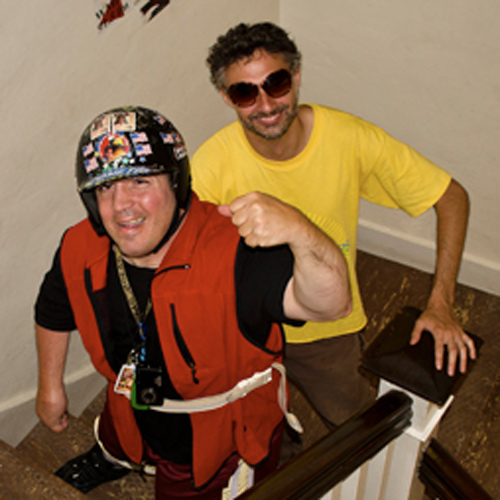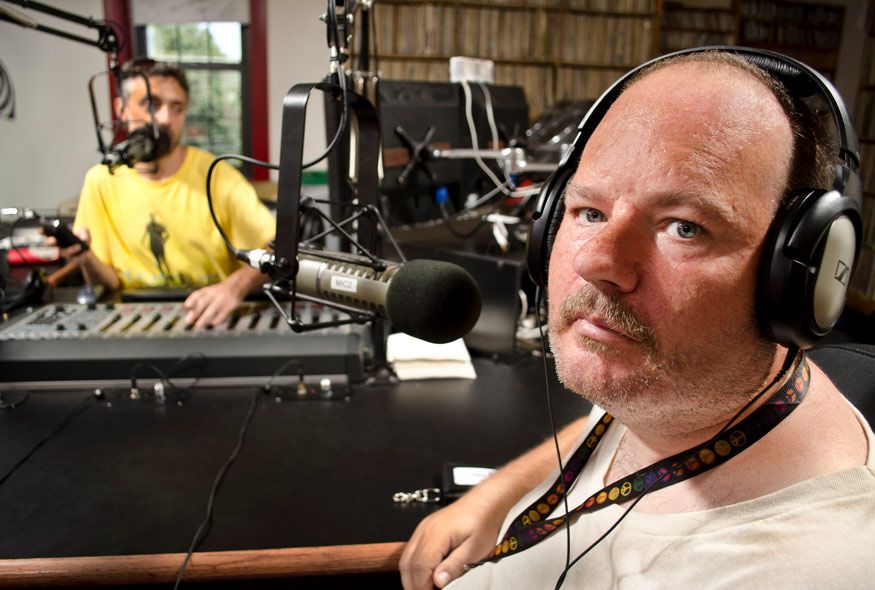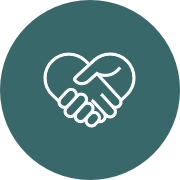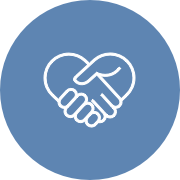
On the Air
There are 48 steps in front of George as he rises unsteadily from his wheelchair. There is no elevator in this old building at Tufts University, and the radio booth that hosts RHD Boston’s weekly radio show is on the third floor. And so, 48 steps – and each one of them looks like a mountain as George grasps the railing with his left hand and RHD art instructor Shawn Morrissey steps behind him to help.
“Let’s go!” George says. “I don’t want to miss it!”
With Morrissey’s help, George starts to climb.
* * *
“Hello, everybody! Welcome to Outside the Lines radio! My name is Kenny and we’re having a great time today!”
Kenny is a client at RHD Boston, a multi-faceted residential program that serves men and women with dual diagnoses of mental illness, developmental disabilities and/or physical disabilities. He’s also an artist at the program’s Outside the Lines Studio. It’s his turn this week to host the radio show that has become a favorite of the clients and something of a phenomenon among the human services providers in the area.
Every Friday morning on 91.5 WMFO, the college radio station at Tufts University, RHD clients take over the airwaves. They play what they want, sing along if they like, and as Kenny said to open the show, they generally have a great time.
“Play ‘Running with the Devil,’” Kenny says.
“Your wish is my command,” Morrissey says, and cues up the Van Halen song.
Morrissey grew up in Medford, Mass., and at one time had his own radio show at Tufts. Working one day at Outside the Lines Studio, Morrissey turned the radio on and noticed how much the clients enjoyed listening to the music. He thought: Wouldn’t it be great if we had a radio show?

He approached the University, and since he had the technical expertise to run the show and Tufts has often been a helpful partner with RHD Boston activities, the student-run station agreed to give them the space and the airtime.
“They said: If you can do it, go for it,” Morrissey said. “Then I thought: Well, can we do it? I thought it might be a challenge, but I was excited about the possibilities. I knew they’d be into the music aspect – having them do it for themselves, expressing themselves and carrying a message to the community. Why not?
“They put the headphones on and they’re in this little bubble and it’s great. Even clients who sometimes can have trouble staying focused, they’re locked in the whole show. Music brings people together. They can choose what they want to listen to; there are no restrictions and no playlist.”
* * *
“I’m lucky,” George says as he pauses on the second floor, although he is still anxious about making the show on time and eager to keep going. “I have a good arm, and a good leg. And my good arm is really good.”
George suffered Traumatic Brain Injury as a child, and now wears a batting helmet most of the time. As a result of the injury, his right arm and right leg have withered, which he explains to anyone who will listen: “It’s like telephone wires – you know what happens if you cut one of the wires? No communication.”
George emphasizes how good his left arm is by flexing his bicep. He turns to Morrissey and says he’s ready to go. The show is starting and he doesn’t want to miss it.
* * *
Denise calls in. She’s a client at another program in the area, and a regular listener to Outside the Lines radio. She requests “Sweet Pea” – she always does, every time, and Morrissey cues it up.
In addition to Outside the Lines studio, where clients gather around the radio when the show comes on and hang on every song, clients at other area providers make sure they catch the show. It’s the only thing on the radio that genuinely feels like theirs.
“Everybody likes to tell their story,” Morrissey said. ‘They see the mic, and this is their chance to tell the world anything. They can talk about the weather, they can tell their entire history. It’s neat; you can play stuff and hopefully please people.
“When we first started, some wouldn’t go because they were shy, or they weren’t into it. But then they’d see other people go and get so excited. And they’d want a piece of it.”
George, having made it in time to join the show, has to remove his helmet to put the headphones on. Co-hosting the show with Kenny, he breathes a sigh of relief.
“I thought I was going to miss it,” he says.
“Well, the spirit of rock and roll always comes through,” Morrissey says.
Kenny and George like that; they shout: “RIGHT ON!”
George wants to play a Beatles song. As Morrissey cues it up, Kenny says: “Turn it up!” They sing along; Morrissey leaves the mic open so that listeners can hear the clients sing.
“Will you still need me
Will you still feed me
When I’m 64?”
“Kenny will tell me two weeks before: I want to go in three weeks. Mark me down. Put me on the calendar,” Morrissey said. “George probably likes it the most; he really gets excited when he can come. That climb … the first time, we treated him like he was fragile, we really eased him up the stairs. But he was kind of charging up, as best he could. And he popped on the earphones, got to the mic and he turned on. He’s a rock star.”
At RHD, day programs are not simply about filling the hours. They’re about being creative and innovative and finding new ways to enhance the clients’ quality of life. Across the country, RHD staffers are empowered to find different ways to support the clients. Outside the Lines radio is just one example. Morrissey, with his background in radio, had the freedom to take this on – and he does it because it’s something that the clients like, and that makes them happy.
“I love the people here. I’m a sucker for them. They’re family,” Morrissey said. “Everybody deserves to be heard. For people that usually don’t have a voice it’s a great opportunity, to turn on the radio and hear a voice that sounds like theirs, and share their stories.”
RHD Boston Director Susan Burnham said one day she was complimenting a client named J.B. who’d hosted the show and was developing a bit of a
following. J.B. said: “I’m glad people like listening to my voice. Because they usually don’t.”
“You can really see the value of it, the power of being listened to, of being heard,” Burnham said. “It’s a wonderful opportunity, and I’m so glad we can do it.”
* * *
“I’m glad I get to be here,” George says, as the show ends. “I like it.”
There are 48 steps in front of George, as he rises unsteadily from his wheelchair. He grasps the railing with his left hand, and Morrissey steps in to support him as George starts down.
“OK, I’m ready,” George says. “Let’s go.”


